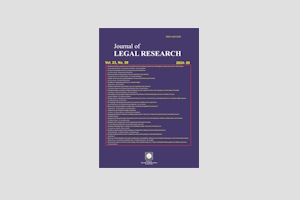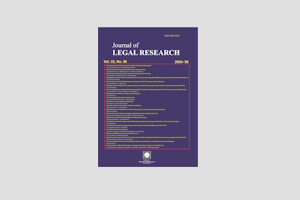Journal of
Legal Research
Number 7
Vol. IV No. 1
Spring – Summer 2005
Managing Editor: Vahid Eshtiagh
Editor-in-Chief: Seyyed Ghasem Zamani
Contents
Articles
European Arrest Warrant and its Impact on Extradition Law in the European Union
Ali Khaleghi (Ph.D.)
Protective Victimology in Light of “The Declaration of Basic Principles of Justice for Victims of Crime and Abuse of Power”
Mehrdad Rayejian Asli
The Impact of Peremptory Norms on the Interpretation and Application of United Nations Security Council Resolutions
Alexander Orakhelashvili; Trans. & Res. by S. Ghasem Zamani (Ph.D.)
Concept, Kinds and Rules Governing Public Contracts
Manuchehr Tabatabai Motameni (Ph.D.)
An outline to Iranian Legal System on the Foreign Investment
Mostafa Mandegar
The Constitutionality and Role of Judges in Iranian Law
Parvaneh Tila
Special Issue: Different Aspects of Banking Law
Legal Aspects of Internet Banking
Mostafa Elsan
Discussion of Principle Agent Theory in Banks on behalf of Depositors in Banking Deposits
S. Elhameddin Sharifi (Ph.D.)
Binding Character of Contracts on Credits Granted by Banks and it’s Ambiguities
Saeed Safian
Settlement of Disputes in International Bank Guarantees
Mohsen Mohebbi (Ph.D.)
Hire-Purchase Contract and Barriers to it’s Development in the Iranian Banking System
Gholam Reza Moini
Critique and Presentation
UN International Law Commission and Iranian Lawyers
Hossein Sharifi Tarazkoohi (Ph.D.)
Articles
European Arrest Warrant and its Impact on Extradition Law
in the European Union
Ali Khaleghi (Ph.D.)
Abstract:
Extradition is one of the old measures of international judicial assistance in
criminal matters which is agreed in bilateral and multilateral conventions. As
a result of the increase of transnational offences in Europe, the member states
of the European Union have faced to a new challenge in combating these
offences and insufficiencies of classic procedure of extradition has been
revealed. Facing this situation, the member states of the European Union
have replaced European arrest warrant to extradition. The new mechanism
does not have the restrictions of extradition and has caused an evolution in
extradition law in these countries. The present article examines the above-said
restrictions and the evolution which is appeared in this matter.
Protective Victimology in Light of “The Declaration of Basic
Principles of Justice for Victims of Crime and Abuse of Power”
Mehrdad Rayejian Asli
Abstract:
Although studying crime victims primarily emerged within the framework of a
negative perspective emphasizing upon blameworthy of victims in the criminal
incident, it is more than three decades that attentions have been addressed to
protecting these vulnerable persons. “Protective Victimology”, thus, is
considered as one of the most recent approach in criminological literature,
which is gradually becoming an independent discipline in the field of criminal
sciences. Meanwhile, it’s international aspect, which followed on the
globalization movement, has made it to be at the centre of attention at the
policy-making level and a significant concern of criminal policies.
Following victimological researches in many countries, the United Nations
made special efforts to codify the international principles and standards on
victim protection. The Declaration of Basic Principles of Justice for Victims
of Crime and Abuse of Power is regarded as the most eminent of such efforts
and assumed as a charter containing the global standards within the
framework of a protective victimology.
The present article reviews the Declaration overall.
The Impact of Peremptory Norms on the Interpretation
and Application of United Nations Security Council Resolutions
Alexander Orakhelashvili
Trans. & Res. by S. Ghasem Zamani (Ph.D.)
Abstract:
The United Nations Security Council is the most powerful institutional body
ever established at the global level. Its existence and powers, as based on the
United Nations Charter, Firmly evidence the support of the entire
international community. At the same time, the will of the international
community as a whole can be expressed at different levels and in different
ways. In today’s international law, there can be little doubt that the
international community as a whole attaches special importance and effects to
peremptory norms of general international law (jus cognes) and endows them
with high status. The interaction between those high-ranking norms and the
powers of the Security Council is therefore among the most central issues of
international law.
Bearing all this in mind, this article will examine the scope and legal
effects of the legal limitations imposed on the Security Council by the
operation of peremptory norms.
Concept, Kinds and Rules Governing Public Contracts
Manuchehr Tabatabai Motameni (Ph.D.)
Abstract:
Contracts and transactions are considered as important issues in the civil code
of Iran. However, public contracts that concluded between the state and a
private person pose some complicated problems in public spheres. It is
obvious that a state remains a state even if it acts as a party of a contract. In
this article, the concept, different kinds and general rules governing public
contracts such as petroleum concessions, labour contracts, banking contracts,
insurance and… are examined.
An outline to Iranian Legal System on the Foreign Investment
Mostafa Mandegar
Abstract:
According to historical data, the Iranian government turned to heavy
borrowing from Western financial institutions. In most cases, these were
utilized for lavish consumption purposes.
Many of these carried clear monopoly rights which conferred a somewhat
unpleasant connotation to the term “Concession” in the eyes of most Iranian
saw this as mortgaging the country for a pittance. Disappointing though the
fates of these venturers proved to be, they gave the country a pool of
experience about positive and negative sides of foreign economic participation
and the need to approach it in a systematic way. Consequently, enacting of the
basic regulations as the foreign investment was made subject to a new set of
requirements.
In 1955, the first law was entitled “Law for the Attraction and Protection
of Foreign Investment” (LAPFI). According to this law foreign direct
investment in Iran is only allowed through participation in the equity capital
of existing legal entities of newly created joint ventures.
The legal facilitates, as it turned out, were contained through the
subsequent regulations concerning foreign investment in Iran under the name
of “Foreign Investment Promotion and Protection Act” (FIPPA) was ratified
by the parliament in 2002. FIPPA’s Replacement of LAPFI has further
enhanced the legal framework and operational environment for foreign
investors in Iran.
The Constitutionality and Role of Judges in Iranian Law
Parvaneh Tila
Abstract:
The Rule of Law requires that any decision-makers including the Parliament
obey the superior laws. Different legal systems established two political
(French) and judicial (American) methods to control of acts of Parliaments.
In Iranian public law, Shora-ye-Negahban (the Constitutional Council) is
primarily responsible to review the parliamentary acts in order to insure their
non-contradiction to the Constitution and Islamic provisions. But nonetheless,
do the Judges have any right or responsibility to control the acts of
Parliament during the judicial process and their judgments? Could we find any
legal pretext to suspend or other non-observations of these laws by the
judges?
In the practices, constitutional interpretations and doctrine, the merely
political control and review of parliamentary acts by the Council, has been
affirmed but some said yes to these questions currently. This article, analyzes
the new but uncommonly thoughts on the role of judges in Iranian
constitutionalism.
Legal Aspects of Internet Banking
Mostafa Elsan
Appearance and development of “Internet” has led to developing in
“Electronic Commerce”. In spite of strength threats, in view of security and
illegally access to computer systems, chances in this means of communication
and interchange, have preferred it to traditional systems. However, because of
the importance and strategic concept of banking and monetary systems,
movement in this field is very carefully and slow. Therefore, the successful
experience of governmental and non-governmental entities in internet
banking, indicate the essence of use of this structure to facilitate and expedite
electronic commerce. In this paper, we discuss, in legal perspective, the
threats and chances of internet banking.
Discussion of Principle Agent Theory in Banks
on behalf of Depositors in Banking Deposits
S. Elhameddin Sharifi (Ph.D.)
Islamic precepts influence the structure and activities of Islamic banks and
prohibit them against the payment and receipt of a fixed or predetermined
rate of interest. In these banks, such as Iranian banks, the interest-based
banking system is replaced by profit-loss sharing system. In granting credits
and receiving profit, they use participating contracts such a Joale,
Hire-Purchase and participation, instead of loan contracts and in
profit-payment to the depositor, used the principle-agent theory.
But the theory, for it’s unreal nature, is unbiased to the parties intention
and is insufficient to regulate the banks and depositors relationship.
Moreover, the theory have effects, that can not be applied in normal banking
policy.
Binding Character of Contracts on Credits Granted by Banks
and it’s Ambiguities
Saeed Safian
According to Iranian legislation on banking operations without interest, it is
recognized that the contracts on credits granted by banks have a binding
character. However, under the amendment of this legislation, this character is
depending upon agreement of the parties and absence of dispute on the
contract.
The ambiguities arising out of the amendment have been studied in this
article.
Settlement of Disputes in International Bank Guarantees
Mohsen Mohebbi (Ph.D.)
As an important financial instrument, bank guarantees are issued to secure
international contracts. The characteristics of bank guarantee, in particular
the principle of independence of guarantee from underlying contract require a
particular definition of this instrument and as a private contract subject to the
law of obligations, in general. The claims arising out of bank guarantees are to
large extent co-related to its vary character and the principle of independence
of guarantee from the basic contract. The two more important issues of such
claims before the courts are the question of applicable law and competent
court. In this article, these two questions are discussed in details.
Hire-Purchase Contract and Barriers to it’s Development
in the Iranian Banking System
Gholam Reza Moini
Despite being new, Hire-Purchase is a contract which has been expanded a lot
and many people whether governmental or private even in international level
conclude this type of contract. Furthermore, one of the means of granting the
credits to persons in the Iranian banking system is Hire-Purchase contracts.
The contract has many special capabilities, hence Iranian legislator considered
it as an appropriate means for granting of banking facilities. However some
problems have raised barriers to development of Hire-Purchase contracts in
the Iranian banking system.





